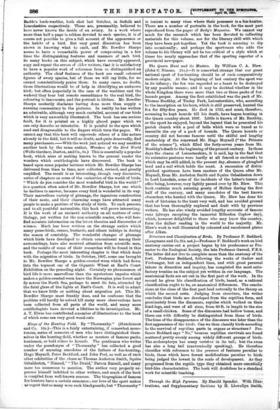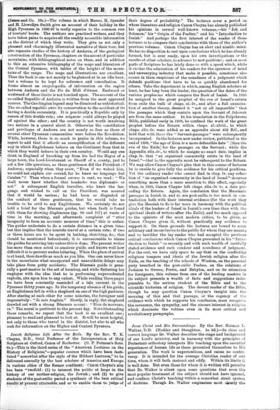Through the High Pyrenees. By Harold Spender. With Illus- trations,
and Supplementary Sections by H. Llewellyn Smith. (limes and Co. 16s.)—The volume in.which Messrs. H. Spender and H. Llewellyn Smith give an account of their holiday in the High Pyrenees in 1896-97 is vastly superior to the common run of tourists' books. The authors are practised writers, and they have taken pains to acquire all the readily accessible information on the district of which they write. They give us not only a pleasant and charmingly illustrated narrative ef their tour, but also separate studies of the history of Andorra,. of the geological construction of the Pyrenees, chapters on theascent of particular mountains, with bibliographical notes on them, and in addition to this an extensive bibliography of the maps and literature of the Central Pyrenees, with tables of ,the heights of the moun- taine f the range. The maps and illustrations are _excellent. Thus the book is one not merely to beglanced at in an idle hour, but a volume to be kept for reference and consultation. It forms almost an encyclopedia of inforrnatien on the region between Andorra and the Pic du Midi &Oman. Eastward or westward of these limits is not touched upon. The account of the, so-called Republic of Andorra is written from the most approved sources. The Carolingian legend may be dismissed as unhistorical. The so-called republic owes its conservation to the accident of its having a double suzerainty. It is practically a Republic only by reason of this double rule ; one seigneur could always be played off against the other ; and the country is not worth involving two nations in a quarrel about it. Otherwise the constitution and privileges of Andorra are not nearly so free as those of several other Pyrenean conrmunities were before the Revolution. While, however, there is so much to praise in this volume, we regret to add that it affords an exemplification of the different way in which Englishmen behave an the Continent from that in which they would behave in their own country. Would any one think in England of knocking up from his bed the Mayor of a large town, the Lord-Lieutenant or Sheriff of a county, just to ask a few idle questions, as these gentlemen did the President cf Andorra; especially when they avow, "Even if we waked him, we could not explain our errand, for he knew no language but Catalan" P Then when a formal excuse is sent, we read : "We shall never know whether that headache was diplomatic or not." A subsequent English traveller, who knew the lan- guage and wished to call on the President, was assured that it would be useless ; he had been so disgusted at the conduct of these gentlemen, that he would take no trouble to be civil to any Englishman. We certainly -do- not hold a brief for the Bearnais guides, but when fault is found with them for showing displeasure (pp. 80 and 197) at waste of time in the morning, and afterwards complaint of "utter incapacity to form an accurate measure of time," this is unfair. The guides undertake to do a certain distance in a given time. but this implies that the tourists travel at a certain rate; if two or three_ hours are to be spent in bathing, sketching, 4lr.e., this should be mentioned beforehand; it is unreasonable to blame the guides for arriving late unless this is done, The present writer has more than once acted as amateurrgaide, and knows well how difficult it is to prevent undue loitering. When the place of arrival is at hand, then dawdle as much as you Eire. One can never_know in the mountains what unexpected and unavoidable delays may take place from petty accidents. The Idearnais guide is gene- rally a past-master in the art of humbug, and while flattering his employer with the idea that he is performing unprecedented exploits, sits upon him to any extent, , While reading these, pages we have been constantly reminded of a tale current in the Pyrenees thirty years ago. In the temporary absence of his guide, an Englishmen fell in with a shepherd on one of the high pastures. After staring at each other for some minutes, the foreigner said impressively : "Je suis Anglais." SlowlY, in reply, the shepherd drawled out with a strong Bearnais accent : " Rien de nouveau, ca." The moral is pertinent to the present day. Notwithstanding these remarks, we repeat that the book is an excellent one; pleasant to read and pleasant to look at. It will be most not only to those who travel in the district, but also to all who seek forinformation on the-Higher and Central Pyrenees: -























































 Previous page
Previous page